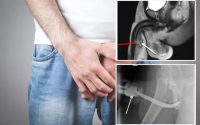Groundbreaking tooth regrowing drug is in the works
Brace yourself — a new “miracle” drug that could regrow your own teeth is in the works.
Researchers in Japan are currently working on a medication that would allow people to grow a new set of teeth, with a clinical trial slated for July 2024, the country’s national daily news site, the Mainichi, recently reported.
“The idea of growing new teeth is every dentist’s dream,” Dr. Katsu Takahashi, a lead researcher and head of the dentistry and oral surgery department at the Medical Research Institute Kitano Hospital, told the outlet.
“I’ve been working on this since I was a graduate student,” he continued. “I was confident I’d be able to make it happen.”
The innovative new medicine helps treat people who don’t have a full set of adult teeth due to “congenital factors,” and researchers say it could be available for public use in 2030.
If successful, it will be the first drug in the world that will allow patients to regrow teeth.


Takahashi has been working on this research at Kyoto University since around 2005, and found that in mice, there was a particular gene that affected the growth of their teeth.
The antibody for this gene, USAG-1, can help stimulate tooth growth if it is suppressed — something that Takahashi further explored in a 2021 study published in Science Advances.
Scientists have since worked to develop a “neutralizing antibody medicine” that is able to block USAG-1. When tested in mice and ferrets, researchers found that the animals were able to grow new teeth.
The drug would help people who have a rare genetic disorder called anodontia, which is a total “absence of teeth,” according to the Cleveland Clinic, due to them never developing.
Those who have this condition can have an absence of baby teeth and/or adult teeth, and can present in the absence of six or more teeth, per the Cleveland Clinic.


Takahashi hopes the new medicine could be just another option for those who don’t have a full set of teeth.
“In any case, we’re hoping to see a time when tooth-regrowth medicine is a third choice alongside dentures and implants,” Takahashi told the outlet.
After the medicine goes through the necessary tests, researchers hope to make it available to treat kids from ages 2 to 6 who display signs of anodontia, according to the Mainichi.
“We hope to pave the way for the medicine’s clinical use,” he said.
However, these are not the only researchers who have made strides in human organ regrowth.
In 2018, scientists at the University of Washington School of Medicine developed an automated system that allowed robots to produce human mini-organs made from stem cells.
And in April 2022, scientists at Columbia University created a set of real human organs that interact on a chip.
The project leader was able to engineer “human heart, bone, liver and skin that are linked by vascular flow with circulating immune cells.”


